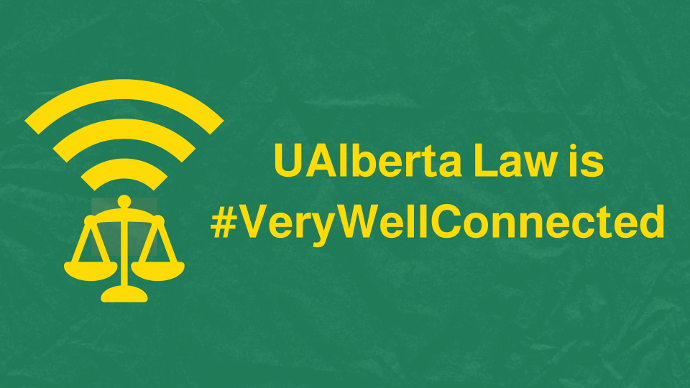#VeryWellConnected: UAlberta Law’s nimble approach to remote classes
Sarah Kent - 25 May 2020

Almost overnight, the University of Alberta moved classes online due to the global public health crisis this spring, and instructors at the Faculty of Law responded swiftly and deftly to ensure law students could keep learning.
Virtual delivery of course content takes a huge amount of planning, effort and co-ordination for faculty, who worked tirelessly to make the transition as smooth as possible for students.
While Professors Steven Penney and Anna Lund took different approaches to remote delivery, their dedication to students is a common thread that captures UAlberta Law’s values.
Professor Penney
Penney, who teaches in the areas of criminal procedure and evidence, was well-equipped for remote delivery in March 2020 due to his flipped classroom model.
Before the pandemic, Penney was regularly recording and uploading lectures online so that students could learn key concepts before engaging in active learning (participating in discussions, problem-solving, case studies, etc.) during class.
Penney’s technical prowess quickly became vital knowledge as in-person classes were disbanded, and classes began to be delivered over Zoom and Google Meet. He hosted online lectures, posted videos, held virtual office hours and continued to engage students.
While there were challenges to online delivery for both faculty and students, Penney noted some upsides.
“The (online) chat function worked very well to encourage students to ask questions who might not otherwise be willing to put up their hand and speak in a large classroom,” he said.
“Students would not only use chat to engage me but would also engage each other,” said Penney, noting that students would jump in to answer each others’ questions.
Penney, who is no stranger to technology in the classroom, thinks the chat function may have a place in the physical classroom when social distancing restrictions are eased.
With the cancellation of in-person classes occurring just three weeks shy of exams, Penney knew that students needed extra support.
“I tried to engage students more in terms of helping them with exam preparation,” said Penney, who hosted additional Q&A sessions for students that gave them an opportunity to ask questions in an informal setting.
With UAlberta now officially deciding to hold most classes remotely for the Fall 2020 term, Penney has more refinements planned for remote delivery, including using the flipped classroom model, which earned him the 2020 Hon. Tevie H. Miller Teaching Excellence Award.
Professor Lund
Assistant Professor Anna Lund was not as familiar with virtual learning tools as Professor Penney but had been experimenting earlier in the semester with broadcasting the audio of her UAlberta Law lectures to make the classroom more accessible to students who could not be physically present.
When UAlberta moved online, she initially planned to do live lectures, but the closure of daycares across the province meant she had to innovate as her son was now home with her.
She was also aware that students’ personal and family obligations had changed and that she had a responsibility as an instructor to adapt to those circumstances.
She created pre-recorded lecture content that could be viewed at any time and then used the live component of classes for discussion. In her civil procedure class, the live sessions, which were dubbed “coffee hour chats,” became a place for students to connect and check-in.
“The class really evolved based on student interest in civil procedure but also just on how people were surviving the changes,” said Lund. “We talked about, ‘what are you doing for exercise, how are you managing anxiety?’ ”
With her son sitting in on the class, Lund also invited her students’ children and pets to join the sessions, a gesture that brought the class together.
“One of the things I missed the most when we moved online was those interactions with students,” she said. “To be able to recreate that in some small way when everyone was going through a stressful time was really valuable for me, and I hope for my students, too.”
The learning didn’t stop either, said Lund, who has won numerous accolades for her teaching, including the Provost’s Award for Early Achievement of Excellence in Undergraduate Teaching, UAlberta’s Award for Outstanding Mentorship in Undergraduate Research & Creative Activities, and UAlberta Law's Tevie H. Miller Teaching Excellence Award.
Lund was impressed by her students’ willingness and determination to keep going when UAlberta moved to a pass/fail system.
“Students still engaged with the material in a serious and considered way,” said Lund. “There are bigger things motivating them than that search for grades.”